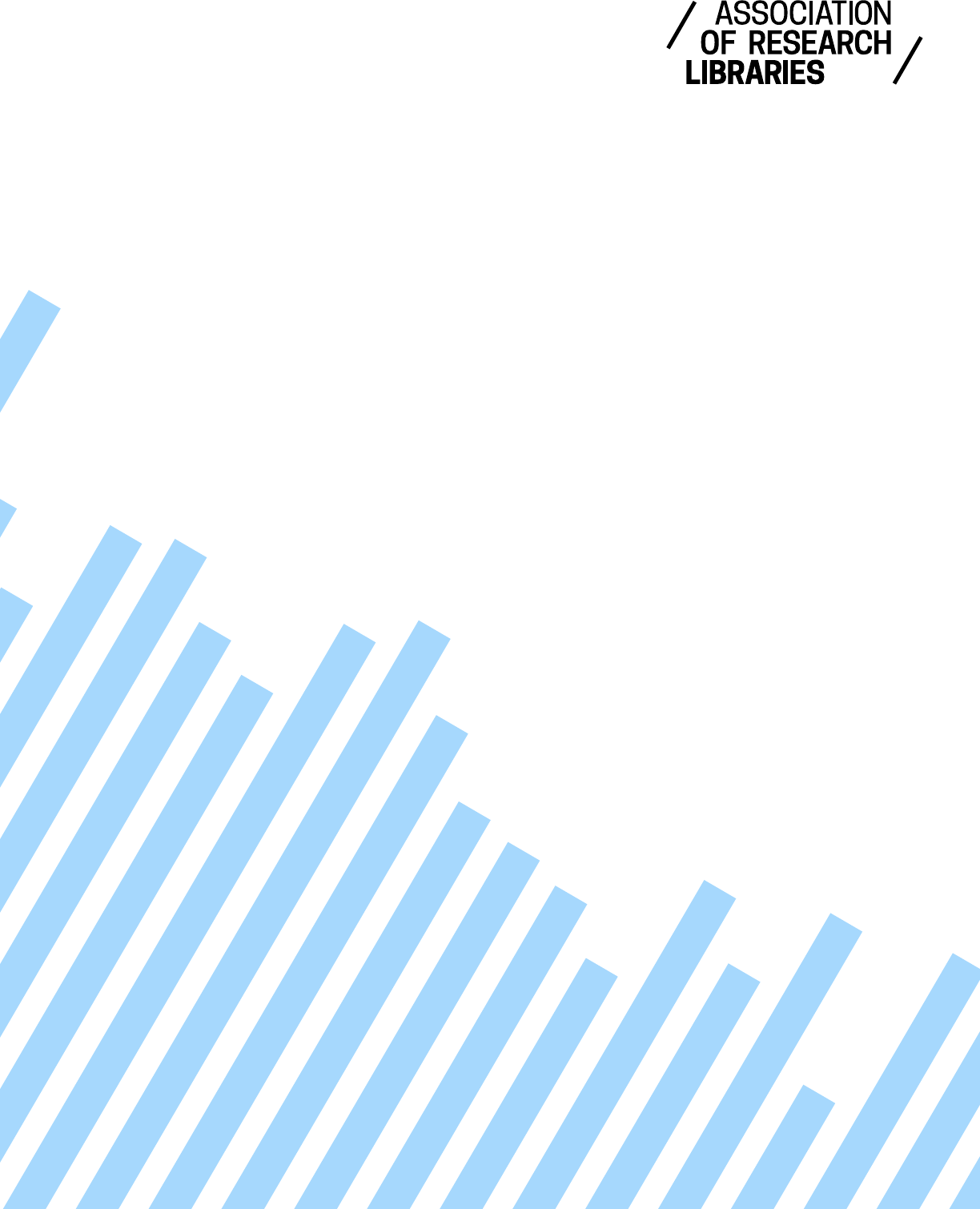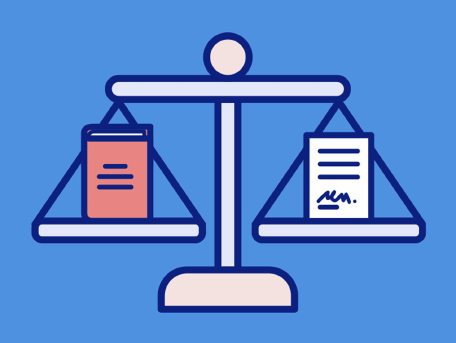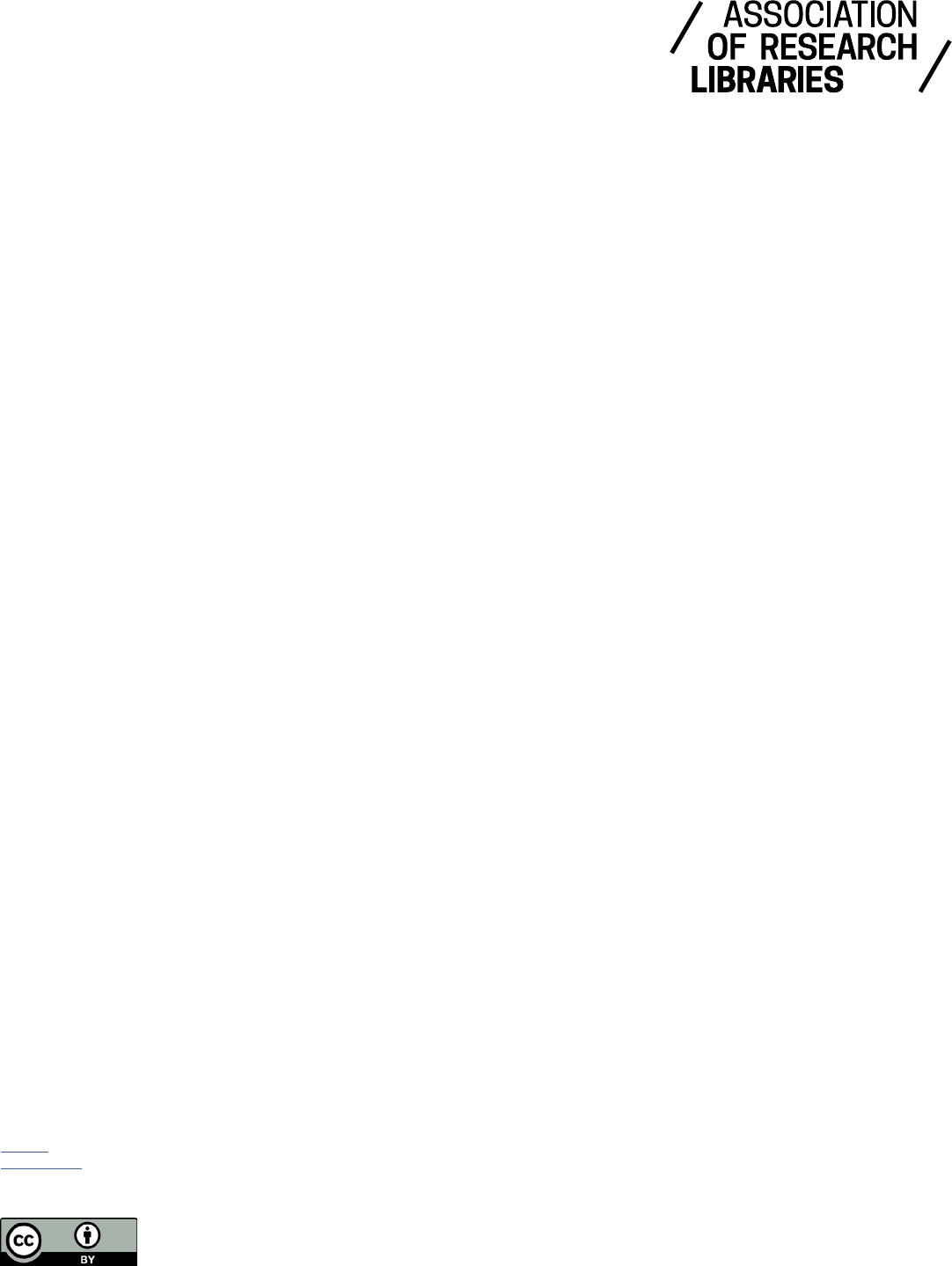
Copyright and Contracts:
Issues & Strategies
by Katherine Klosek
July 22, 2022

2
Copyrights and Contracts
Table of Contents
Introduction 3
Licenses for Digital Content Restrict Lawful Uses of Copyrighted Works 4
Contracts and Section 108 of US Copyright Act 6
Digital Millennium Copyright Act Report (2001) 6
Section 108 Study Group (2005–2008) 6
Copyright Oce Section 108 Study (2017) 6
Advocacy and Policy Strategies 7
Rights-Savings Clauses 8
Rights-Savings Clauses—Negotiation 8
Rights-Savings Clauses—Regulation 9
Statement Asserting Library Rights 10
Open Access 11
Open-Access Policies and Rights-Retention Strategies 12
State Strategies 12
Unenforceable Contracts 12
Public Funds 13
Federal Exemptions
14
Congressional Intervention 14
Next Steps 15
Test Case 15
ARL Strategies
16

3
Association of Research Libraries
Copyrights and Contracts
Introduction
Copyright and fair use have been cornerstones of the Association of
Research Libraries (ARL) public policy portfolio for many years. The
Association and its partners have influenced copyright and public-
access policies, advanced model licensing language to optimize
the terms of digital access for libraries, and educated stakeholders
across the research ecosystem about the importance of both user and
author rights. In tracking this work over decades, we have observed
a disturbing trend: when licensing digital content, publishers include
terms that prohibit certain uses that would otherwise be lawful under
the US Copyright Act and related regulations. Over time, a culture
and set of professional practices among both publishers and libraries
has normalized these restrictions; a prime example of this is the
outdated reliance on the Commission on New Technological Uses of
Copyrighted Works (CONTU) Guidelines for interlibrary loan.
In 2006, the American Library Association (ALA) framed this issue
as follows: “License agreements, rather than outright sales, have
become an accepted and prevalent means for publishers to provide
their products to libraries. And although licensing has proven to
be a convenient way to obtain journals, for example, license terms
can expand—or restrict—the uses of a work that would have been
allowed under the copyright law. Some people even ask, ‘Is copyright
dead?’ That is, does increased use of licensing of information make
copyright law irrelevant?” In 2019, ALA hosted a “Copyright Contract
Override Workshop” to continue this inquiry. The conversations
at that workshop led to a shift from discussing contract “override”
to contract “preemption,” a term that appears in the Copyright Act
itself. Participants of the ALA workshop also observed that issues and
strategies around contract preemption will vary at the state and federal
level. In 2020, ALA published “The Need for Change: A Position Paper
on E-lending by the Joint Digital Content Working Group;” the paper
acknowledged that some library vendors’ business practices mean that
libraries cannot access certain content, especially streaming.

4
Copyrights and Contracts
Association of Research Libraries
In 2020, ARL’s Advocacy and Public Policy Committee launched a
digital rights initiative focused on understanding and safeguarding
the full s
tack of research libraries’ rights: to acquire and lend digital
content to fulfill libraries’ functions in research, teaching, and learning;
to provide accessible works to people with print disabilities; and to
fulfill libraries’ collective preservation function for enduring access to
scholarly and cultural works. Our objective is to make sure that these
rights are well understood by research libraries, by Congress, by the
Copyright Office, and by the courts.
Licenses for Digital Content Restrict Lawful Uses of Copyrighted
Works
Since the inception of copyright law, libraries have enjoyed special
rights to promote the progress of science and the useful arts. Congress
and courts have reiterated that teaching and research—two functions
in which research libraries directly engage—are favored purposes of
fair use. In 2020, ARL libraries were spending a median of 80 percent
of their acquisitions budget to license electronic resources.
1
In such
a licensing arrangement, a copyright owner grants permission for
a licensee to use the work under certain terms and conditions; this
regime eectively extends the rights of the copyright owner to allow
their control of subsequent distributions of the work.
Unfortunately, in licenses for digital scholarly content—the majority
of content acquired by research libraries—publishers often include
terms that prohibit certain uses that would otherwise be allowable
under the Copyright Act. For instance, licenses may require libraries or
individual researchers to negotiate for otherwise lawful activities, such
as text and data mining, and to pay exorbitant fees on top of the cost of
the content itself. While new regulations allow researchers to
circumvent technological protection measures to access copyrighted
materials, licenses for that content may include terms that explicitly
prohibit this circumvention. In many cases, these activities might
actually increase the value of published material; for instance, if a
5
Association of Research Libraries
Copyrights and Contracts
data-mining project yields new knowledge about a topic covered in a
journal, it may very well spark new interest in that journal’s content.
Libraries and publishers have often assumed that license terms that
restrict copyright exceptions are enforceable under state contract law.
There is, however, surprisingly little case law on this point. Arguably,
contract terms that seek to limit exceptions under the Copyright Act
are preempted under a conflict-preemption theory. This is the theory
under which the district court in Association of American Publishers
(AAP) v. Brian E. Frosh found the Maryland e-book licensing statute to
be preempted by the federal Copyright Act. The judge in AAP v. Frosh
made clear that Congress established a uniform national system in the
Copyright Act, and a state could not adopt a law that conflicted with
that national system. Under that reasoning, an individual rightsholder
should not be able to rely on state contract law to override that national
uniformity.
To be sure, the Copyright Act’s exception for libraries and archives,
Section 108(f )(4), provides that “nothing in this section…in any way
aects…any contractual obligations assumed at any time by the library
or archives when it obtained a copy or phonorecord of a work in its
collections.” This suggests that Congress did not intend for Section
108 to preempt enforcement of contract terms under state contract
law. However, the language of Section 108(f )(4) does not apply to
other limitations relied upon by libraries, such as Sections 107, 121,
or 121A, so there is no reason to assume that Congress intended to
permit contracts to nullify these provisions. This particularly is the
case with respect to fair use, because it is an accommodation to the
First Amendment. Contract terms that would restrict fair use rights
inherently restrict the constitutional right to free speech.
To say the least, this is an extremely complex issue that has not yet
been fully considered by the courts. The few cases that have addressed
the issue are inconsistent and do not involve libraries.
2

6
Association of Research Libraries
Copyrights and Contracts
Contracts and Section 108 of US Copyright Act
In the context of discussions to update Section 108, libraries have
argued that the language of Section 108(f )(4), mentioned above, should
be amended. The Copyright Oce has not been receptive to this
suggestion.
Digital Millennium Copyright Act Report (2001)
In a 2001 report, the Copyright Oce acknowledged concerns that
library associations raised about licenses for digital information
displacing provisions of the Copyright Act. The report concluded,
“although market forces may well prevent right holders from
unreasonably limiting consumer privileges, it is possible that at some
point in the future a case could be made for statutory change.”
Section 108 Study Group (2005–2008)
In 2005, the US Copyright Oce and the National Digital Information
Infrastructure and Preservation Program of the Library of Congress
sponsored a study group to review how Section 108 of the US
Copyright Act could be updated to address digital works and digital
transmissions. In its final report in 2008, the study group agreed that
“the terms of any negotiated, enforceable contract should continue to
apply notwithstanding the section 108 exceptions,” pointing out that
“[f ]reedom to contract is a fundamental principle in American law.”
However, the group disagreed as to whether Section 108 exceptions—
such as those for preservation—should prevail over contrary terms in
non-negotiated contracts.
Copyright Oce Section 108 Study (2017)
In 2017, the Copyright Oce published a discussion document on
Section 108 with two proposed changes to Section 108(f )(4). The first
change would “clarify that the primacy of contract language applies
to license agreements as well as purchase agreements.” Here, the
Copyright Oce cited the study group’s analysis: although Section
7
Association of Research Libraries
Copyrights and Contracts
108 was enacted prior to the development of markets for licensing
electronic media, the provision covers non-negotiable licenses.
The second proposed change states that libraries, archives, and
museums would not be liable for copyright infringement “if they make
preservation or security copies of works covered by non-negotiable
contractual language prohibiting such activities.” In sum, under the
Copyright Oce’s proposal, a library that engaged in preservation
activities permitted by Section 108 but prohibited by a non-negotiated
license term would not infringe copyright but would breach the license.
Advocacy and Policy Strategies
Libraries and library consortia work to overcome problematic contract
terms by negotiating for favorable license terms that do not waive
rights like fair use, and that do not require a user to seek permission
from a rightsholder for otherwise lawful uses. Some larger, well-
resourced institutions have had success with rights-savings clauses,
a strategy that is described below. But voluntary, licensing-based
solutions may not be viable and sustainable for all institutions. Other
solutions, like changes to the Copyright Act, may present their own
challenges; any discussion about amending the Copyright Act would
certainly get the attention of rightsholders and their lobbyists, and may
result in unintended consequences that are worse than the status quo.
The remainder of this discussion paper explores strategies to allow
research libraries to advance the constitutional purpose of copyright.
The strategies are arranged in order of the scope of their potential
impact, which is also illustrated in the table below.

8
Association of Research Libraries
Copyrights and Contracts
Strategy Scope of Potential Impact
All Readers State by State Institution by
Institution
National open-
access policy
X
Campus open-
access policies
X
Rights-savings
clause
X
Statement
asserting
library rights
X
State
consumer-
protection law
X
State savings
clauses
X
State public
funds/
procurement
policy
X
Federal
exemptions
X
Test case X
Rights-Savings Clauses
Rights-Savings Clauses—Negotiation
When licensing digital materials, libraries may retain their fair-use
rights through fair-use savings clauses, as in this 2016 agreement
between the University of California and the American Chemical
Society (ACS):

9
Association of Research Libraries
Copyrights and Contracts
Fair Use: Nothing in this Agreement shall in any way exclude,
modify or aect anything the Grantee or an Authorized User is
allowed to do in respect of any of the ACS Products consistent with
the Fair Use Provisions of United States Copyright Law.
This strategy may be easiest and most eective for larger, wealthier
institutions that have more power when negotiating with vendors;
smaller, less-resourced institutions may not have the ability to walk
away from negotiations with vendors that are unwilling to meet the
terms of these clauses.
Libraries that do have the power to engage in meaningful negotiations
with publishers may consider broadening these savings clauses to
reflect that contract terms may not interfere with any rights granted
under copyright law, beyond fair use, to preserve exemptions like
breaking digital rights management (DRM) locks that the Copyright
Oce has granted under Section 1201 rulemaking. The Association of
Southeastern Research Libraries (ASERL) recommends that licenses
for content should forgo DRM restrictions in favor of usability:
Digital Rights Management (DRM) technology will not be used in
such a way as to limit the usage rights of a Licensee or any
Authorized User as specified in this Agreement or under applicable
law. In the event that Licensor utilizes or implements any type of
DRM technology to control the access to or usage of the licensed
content, Licensor will provide to Licensee a description of the
technical specifications of the DRM and how it impacts access to or
usage of the licensed content. If the use of DRM renders the
licensed content substantially less useful to the Licensee or its
Authorized Users, the Licensee has the right to terminate this
Agreement.
Rights-Savings Clauses—Regulation
The US Library of Congress (LC) receives copies of materials that
are distributed to the public electronically through the mandatory

10
Association of Research Libraries
Copyrights and Contracts
deposit; copyright deposit; and cataloging requests, mostly without
any licenses. But to address the problem of contractual restrictions on
digital materials, LC as part of the legislative branch issued a regulation
that preempts any license term that would limit LC’s rights under
copyright. The regulation includes a list of clauses that are deemed
to be inserted into each license agreement to which the LC is a party,
including the following:
Rights Under Copyright Law
The Library of Congress does not agree to any limitations on its
rights (e.g., fair use, reproduction, interlibrary loan, and archiving)
under the copyright laws of the United States (17 U.S.C. 101 et seq.),
and related intellectual property rights under foreign law,
international law, treaties, conventions, and other international
agreements.
The federal agencies that contain libraries—including Health and
Human Services, the Agricultural Research Service, the Departments
of Education and Transportation, and the Smithsonian Institution—
may discuss ways to emulate this regulation-based strategy
.
Statement Asserting Library Rights
As libraries dedicate increasing proportions of their budgets to
licensing digital works, negotiations for scholarly materials require
engagement with faculty and other campus stakeholders to be
successful; otherwise, faculty who need certain content may not be on
board with leaving negotiations. In instances when library agreements
with vendors do not save rights, researchers sometimes negotiate
individual agreements with data providers—independently of the
library—for access to content or for the right to conduct text- and data-
mining research on vendor-provided data sets. Vendors may charge
tens or even hundreds of thousands of dollars for this type of access.
In order to build campuswide partnerships to support negotiations for
reasonable terms in licenses for scholarly materials, ARL may consider
developing a proactive rights statement based on the information

11
Copyrights and Contracts
Association of Research Libraries
compiled on KnowYourCopyrights.org. ARL has employed this strategy
of oering model language to support its members and the library
community in negotiating for fair terms. For instance, ARL developed
model license language in 2012 as a starting point for institutions to
consider as they draft local agreements. Similarly, ARL members and
other libraries may use a proactive library-rights statement to work
with faculty and others on campus to develop policies and practices to
preserve fair use and other rights granted by the Copyright Act.
Engaging faculty is critical to preserving rights during negotiations
for scholarly content, but this will not address the fundamental policy
problem: license terms supersede library rights in every situation
except for when a library refuses to agree to a license, or when a library
successfully negotiates to save certain rights. Rights-savings clauses
along with the strategies described below may strengthen libraries’
positions as arbiters of access to information.
Open Access
Strategies that do away with publication paywalls would moot this
problem; under an open-access strategy, information would be free
and available for use and reuse by the research community and the
rest of society. The ARL community, however, is well aware of the
challenges in broadening the adoption of open access. Because open
access is addressed in many other ARL documents, we do not discuss it
comprehensively here.
While the US does not currently have a national open-access law, many
universities and research institutions have adopted open-access
policies to reduce barriers to sharing research. Strong open-access
policies allow authors to retain all or part of their copyright, and/or
grant institutions limited and non-exclusive rights to its researchers’
work, which can enable dissemination of this work in open-access
repositories. For the past decade, US science agencies with more than
$100 million in research funding have been subject to the public-access
policies for both articles and data that resulted from federal funding.
Copyrights and Contracts

12
Association of Research Libraries
Copyrights and Contracts
Similar policies adopted by the Canadian Tri-Agency govern federally
funded Canadian research outputs. The strategies below address
journal articles; other strategies may be available for other publication
types (journals, monographs, conference proceedings, etc.)
Open-Access Policies and Rights-Retention Strategies
Global adoption of full open access would address many of the
problems described above, particularly for scholarly works that are
protected by copyright. According to the 2002 Budapest Open Access
Initiative (BOAI), “the only role for copyright…should be to give
authors control over the integrity of their work and the right to be
properly acknowledged and cited.” In other words, copyright should
not be a gatekeeper to providing public-access to scholarly materials;
open-access works are still protected by copyright. In describing how
to achieve open access to scholarly journal literature, the BOAI calls for
open-access journals that will use copyright to ensure permanent open
access to all articles they publish, rather than invoking copyright to
restrict access and use.
In a Rights Retention Strategy as envisioned by cOAlition S, authors
or their institutions retain copyright to their publications. When
submitting a manuscript, the author applies a Creative Commons CC-
BY license or another type of acceptable reuse license to the author-
accepted manuscript (AAM), and then deposits the AAM in an open-
access repository at the time of publication, without an embargo,
making the manuscript open and available for users to access, read, and
disseminate.
State Strategies
Unenforceable Contracts
State legislatures could adopt a provision stating that no contract term
inconsistent with copyright exceptions and limitations is enforceable
under the contract law of that state. In contrast to the Maryland

13
Association of Research Libraries
Copyrights and Contracts
e-book licensing law, this approach likely would not be preempted
by the Copyright Act because it is not inconsistent with the exclusive
rights provided to copyright owners under the Copyright Act; after
all, the Copyright Act includes those exceptions. There are some court
decisions finding such provisions not to be preempted (see Vault v.
Quaid, 847 F.2d 255 (5th Cir. 1988)). Indeed, the decision principally
relied upon by the district court in AAP v. Frosh—Orson v. Miramax, 189
F.3d 377, 386 (3d Cir. 1999)—stated:
a state regulation falling within the federally established exceptions
to those rights, such as fair use, see 17 U.S.C. § 107, may obligate a
copyright holder to change its practices to accommodate such uses,
see, e.g., Association of Am. Med. Colleges v. Cuomo 928 F.2d 519,
525-26 (2d Cir.1991) (remanding to district court to make factual
findings on whether existing state law constitutes fair use)
A state legislature could narrow such a contractual “override” provision
to apply only to licenses entered into by libraries.
Public Funds
State legislatures may consider establishing criteria for public
institutions to meet when spending public funding; examples may
include laws nullifying any terms that limit fair use in a license entered
into by a library that receives state funding, or restricting libraries that
receive state funding from entering into a license that limits fair use
and other rights aorded by the Copyright Act.
Legislation governing the use of public funds would not implicate
copyright law, and is therefore unlikely to be preempted. This strategy
has the potential to strengthen the negotiating power of public
institutions of higher education; regardless of their size and wealth,
they are the market for digital academic content. However, while
publishers are unlikely to walk away from transactions in states with
such laws, this strategy is narrower in scope and would only apply to
state-funded institutions.

14
Association of Research Libraries
Copyrights and Contracts
Federal Exemptions
Congressional Intervention
Congressional intervention to amend or clarify the Copyright Act
seems like an obvious strategy to address the problem of publishers
imposing license terms restricting lawful use of copyrighted works.
Indeed, the European Union recognizes that copyright exceptions
are useless if private parties could simply override them by contract,
and has included contract-preemption clauses in its directives for the
past three decades. For instance, the EU’s Copyright in the Digital
Single Market Directive provides that “Any contractual provision
contrary to the exceptions provided for in Articles 3, 5 and 6 shall be
unenforceable,” referencing articles that govern text mining and data
mining, digital cross-border teaching, and preservation by cultural
heritage organizations, respectively.
Singapore’s Copyright Bill combines exceptions for certain functions,
such as text mining and data mining, with language prohibiting
contracts from excluding these functions. For instance, Singapore’s
Copyright Act includes a specific exception for “computational data
analysis,” on top of its fair-use exception for research; in addition to
these protections, Singapore’s Copyright Act includes strong language
voiding contracts that would exclude or restrict this lawful use. For
instance, Part 5, “Permitted Uses of Copyright Works and Protected
Performances” includes the following section, listing computational
data analysis as a permitted use that may not be restricted by contract
Permitted uses that may not be excluded or restricted
187.–(1) Any contract term is void to the extent that it purports,
directly or indirectly, to exclude or restrict any permitted use
under any provision in —
(a) Division 6 (public collections), but not section 234 (supplying
copies of published literary, dramatic or musical works or articles

15
Association of Research Libraries
Copyrights and Contracts
between libraries and archives);
(b) Division 7 (computer programs);
(c) Division 8 (computational data analysis); or
(d) Division 17 (judicial proceedings and legal advice).
The Right to Research initiative found a more robust research
environment in countries that have open, general research exceptions,
such as fair use, as well as exceptions for specific activities, such as text
mining and data mining.
However, legislative proposals to adopt federal contract preemption
would face serious opposition from publishers. Any conversation about
amending the Copyright Act would open the door to rightsholders and
other copyright maximalists to assert their influence. Even a push to
enact general copyright misuse provision, so that victims of copyright
misuse would be entitled to actual and statutory damages, may not be
feasible.
Next Steps
ARL will continue to track and understand the legal, political, and
market-based barriers that libraries face.
Test Case
Given the legal uncertainty surrounding contract preemption, libraries
may consider a test-case strategy to see what is permitted under
current law. This would involve a library taking an action consistent
with fair use that is in contravention to a license term, then filing a
declaratory judgment action when the publisher sends a cease-and-
desist letter. A potential downside to the test case strategy is that a
publisher could just turn o access to the content. Unless the library
has downloaded the content and feels some limited sharing of it is
permitted by fair use, the library may be worse o than before.
16
Copyrights and Contracts
Association of Research Libraries
ARL Strategies
The issues presented above are complex and technical, and the best
path forward is unclear. Pursuing any of the strategies described
above will involve working in partnership with members of the
Library Copyright Alliance (LCA) and others in the library
community who advocate for balanced copyright and access to
information. As ARL members discuss these strategies, they may
wish to consider the following:
• How can we best socialize these strategies as an association? As
member institutions?
• Is the library community poised to take on any of these strategies
amongst ourselves? Are there partners we may wish to work with
to develop a best practice or strategy document?
• Is it useful to advance any of these strategies by influencing
public sentiment—for instance, by holding public conversations
or programs, commissioning articles and reports, or presenting at
conferences?
• If so, who might we partner with? What are some upcoming
opportunities?
• Which strategies might be best pursued quietly, without drawing
the attention of those who might push back?
• What context and additional information can ARL members
share about the strategies and examples discussed above?
Copyrights and Contracts
17
Endnotes
1
ARL Statistics 2020 data set, Association of Research Libraries.
2
Compare Vault v. Quaid, 847 F.2d 255 (5th Cir. 1988) with Bowers v. Baystate,
320 F.3d 1317 (2003). There are other arguments a library could raise against
the enforceability of non-negotiated licenses, such as that the library never
manifested assent to the license terms.

